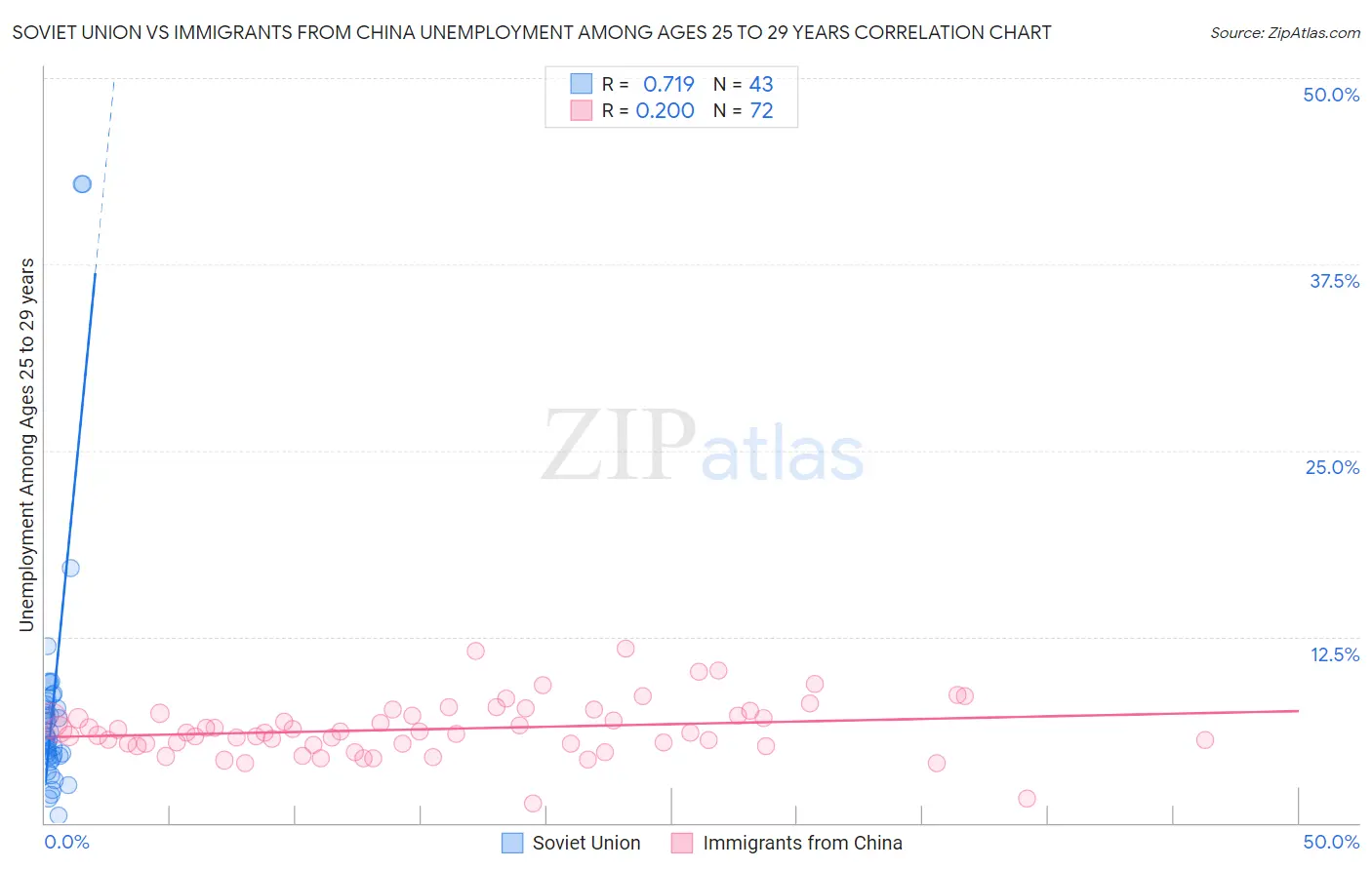Soviet Union vs Immigrants from China Unemployment Among Ages 25 to 29 years
COMPARE
Soviet Union
Immigrants from China
Unemployment Among Ages 25 to 29 years
Unemployment Among Ages 25 to 29 years Comparison
Soviet Union
Immigrants from China
6.2%
UNEMPLOYMENT AMONG AGES 25 TO 29 YEARS
98.9/ 100
METRIC RATING
50th/ 347
METRIC RANK
6.2%
UNEMPLOYMENT AMONG AGES 25 TO 29 YEARS
98.1/ 100
METRIC RATING
62nd/ 347
METRIC RANK
Soviet Union vs Immigrants from China Unemployment Among Ages 25 to 29 years Correlation Chart
The statistical analysis conducted on geographies consisting of 43,269,095 people shows a strong positive correlation between the proportion of Soviet Union and unemployment rate among population between the ages 25 and 29 in the United States with a correlation coefficient (R) of 0.719 and weighted average of 6.2%. Similarly, the statistical analysis conducted on geographies consisting of 429,685,796 people shows a poor positive correlation between the proportion of Immigrants from China and unemployment rate among population between the ages 25 and 29 in the United States with a correlation coefficient (R) of 0.200 and weighted average of 6.2%, a difference of 0.99%.

Unemployment Among Ages 25 to 29 years Correlation Summary
| Measurement | Soviet Union | Immigrants from China |
| Minimum | 0.50% | 1.3% |
| Maximum | 42.9% | 11.7% |
| Range | 42.4% | 10.4% |
| Mean | 7.7% | 6.3% |
| Median | 5.8% | 6.1% |
| Interquartile 25% (IQ1) | 4.4% | 5.3% |
| Interquartile 75% (IQ3) | 8.0% | 7.3% |
| Interquartile Range (IQR) | 3.6% | 2.0% |
| Standard Deviation (Sample) | 8.4% | 1.9% |
| Standard Deviation (Population) | 8.3% | 1.9% |
Demographics Similar to Soviet Union and Immigrants from China by Unemployment Among Ages 25 to 29 years
In terms of unemployment among ages 25 to 29 years, the demographic groups most similar to Soviet Union are Burmese (6.2%, a difference of 0.030%), German Russian (6.2%, a difference of 0.060%), Immigrants from Turkey (6.2%, a difference of 0.080%), Immigrants from Australia (6.2%, a difference of 0.12%), and Latvian (6.2%, a difference of 0.14%). Similarly, the demographic groups most similar to Immigrants from China are Kenyan (6.3%, a difference of 0.070%), Bhutanese (6.2%, a difference of 0.10%), Immigrants from Sri Lanka (6.3%, a difference of 0.12%), Immigrants from Lebanon (6.3%, a difference of 0.18%), and Indian (Asian) (6.3%, a difference of 0.19%).
| Demographics | Rating | Rank | Unemployment Among Ages 25 to 29 years |
| Immigrants | Lithuania | 99.0 /100 | #46 | Exceptional 6.2% |
| Latvians | 99.0 /100 | #47 | Exceptional 6.2% |
| Immigrants | Australia | 99.0 /100 | #48 | Exceptional 6.2% |
| German Russians | 99.0 /100 | #49 | Exceptional 6.2% |
| Soviet Union | 98.9 /100 | #50 | Exceptional 6.2% |
| Burmese | 98.9 /100 | #51 | Exceptional 6.2% |
| Immigrants | Turkey | 98.9 /100 | #52 | Exceptional 6.2% |
| Turks | 98.8 /100 | #53 | Exceptional 6.2% |
| Swedes | 98.8 /100 | #54 | Exceptional 6.2% |
| Immigrants | Netherlands | 98.7 /100 | #55 | Exceptional 6.2% |
| Immigrants | Burma/Myanmar | 98.7 /100 | #56 | Exceptional 6.2% |
| Immigrants | Saudi Arabia | 98.6 /100 | #57 | Exceptional 6.2% |
| Immigrants | Eastern Asia | 98.4 /100 | #58 | Exceptional 6.2% |
| Luxembourgers | 98.3 /100 | #59 | Exceptional 6.2% |
| Immigrants | Taiwan | 98.3 /100 | #60 | Exceptional 6.2% |
| Bhutanese | 98.2 /100 | #61 | Exceptional 6.2% |
| Immigrants | China | 98.1 /100 | #62 | Exceptional 6.2% |
| Kenyans | 98.0 /100 | #63 | Exceptional 6.3% |
| Immigrants | Sri Lanka | 97.9 /100 | #64 | Exceptional 6.3% |
| Immigrants | Lebanon | 97.8 /100 | #65 | Exceptional 6.3% |
| Indians (Asian) | 97.8 /100 | #66 | Exceptional 6.3% |